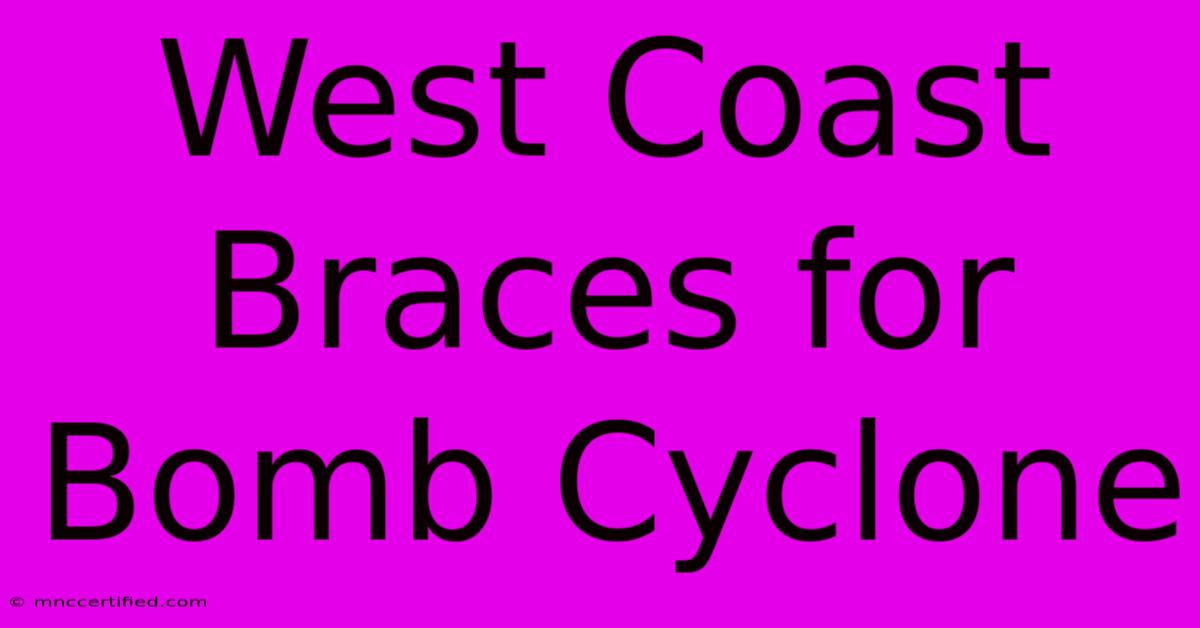West Coast Braces For Bomb Cyclone

Table of Contents
West Coast Braces for Bomb Cyclone: Preparing for Extreme Winter Weather
The West Coast, known for its mild climate, is bracing for an unprecedented weather event: a bomb cyclone. This powerful storm promises to bring blizzard conditions, heavy snowfall, high winds, and coastal flooding, impacting millions across the region. Understanding the severity of this weather phenomenon and taking proactive steps to prepare is crucial for minimizing potential risks.
What is a Bomb Cyclone?
A bomb cyclone, also known as bombogenesis, is a rapidly intensifying extratropical cyclone. It occurs when atmospheric pressure drops dramatically in a short period, leading to a significant increase in wind speed and storm intensity. These storms are capable of producing extreme weather conditions, far exceeding typical winter storms. The West Coast, usually accustomed to milder winters, is particularly vulnerable to the devastating effects of such a powerful system.
Key Impacts of the West Coast Bomb Cyclone:
- Heavy Snowfall: Mountainous regions and even lower elevations can expect significant snowfall accumulation, potentially leading to travel disruptions, power outages, and school closures.
- High Winds: Gale-force winds will create hazardous conditions, potentially causing damage to property, power lines down, and dangerous driving conditions.
- Coastal Flooding: Storm surge combined with high tides could result in coastal flooding, impacting beachfront properties and coastal communities.
- Extreme Cold: Temperatures will plummet significantly below average, leading to hypothermia risks and increased demand for heating resources.
Preparing for the West Coast Bomb Cyclone: A Comprehensive Guide
Preparing for a bomb cyclone requires proactive planning and preparation. Here's a detailed guide to help you stay safe:
Before the Storm:
- Create an Emergency Kit: Stock up on essential supplies like water, non-perishable food, flashlights, batteries, a first-aid kit, medications, blankets, and warm clothing. Consider a portable power bank for your devices.
- Charge Devices: Ensure your phone, laptop, and other electronic devices are fully charged.
- Secure Your Property: Clear loose debris from your yard, secure outdoor furniture, and protect windows and doors from high winds.
- Fuel Up Your Vehicle: Fill up your gas tank to avoid fuel shortages.
- Make a Communication Plan: Establish a communication plan with family and friends in case of power outages or communication disruptions.
- Monitor Weather Reports: Stay informed about the storm's track and intensity by monitoring reliable weather sources. Pay close attention to official warnings and advisories.
During the Storm:
- Stay Indoors: Avoid unnecessary travel during the storm. If you must travel, exercise extreme caution.
- Conserve Energy: Reduce energy consumption to minimize the risk of power outages.
- Stay Warm: Dress in layers to stay warm and avoid hypothermia.
- Monitor Conditions: Keep a close eye on the weather and be aware of potential hazards.
- Report Power Outages: Contact your power company immediately if you experience a power outage.
After the Storm:
- Check for Damage: Inspect your property for damage and take necessary precautions.
- Avoid Floodwaters: Never drive or walk through floodwaters.
- Report Damage: Report any damage to your local authorities.
- Check on Neighbors: Check on elderly neighbors or those who might need assistance.
- Be Patient: Restoration of services and infrastructure may take time.
Staying Informed is Key: Reliable Resources
Staying informed about the bomb cyclone's progression is paramount. Refer to these trusted sources for up-to-date weather information and safety advice:
- National Weather Service (NWS): The official source for weather forecasts and warnings.
- Local News Channels: Your local news channels will provide updates specific to your region.
- Emergency Management Agencies: Consult your local emergency management agency for specific safety guidelines and evacuation information.
This bomb cyclone presents a significant threat to the West Coast. By taking proactive steps and staying informed, you can significantly reduce your risk and ensure your safety and the safety of your loved ones. Remember, preparedness is key to weathering this extreme weather event.

Thank you for visiting our website wich cover about West Coast Braces For Bomb Cyclone. We hope the information provided has been useful to you. Feel free to contact us if you have any questions or need further assistance. See you next time and dont miss to bookmark.
Featured Posts
-
Brown Insurance Group Archdale Nc
Nov 23, 2024
-
Casey Concedes Pennsylvania Senate Race
Nov 23, 2024
-
Gms F1 Bid Grid To Expand
Nov 23, 2024
-
Gray Brace Earns Argyle A Point
Nov 23, 2024
-
Gatwick Airport Suspect Package Two Detained
Nov 23, 2024